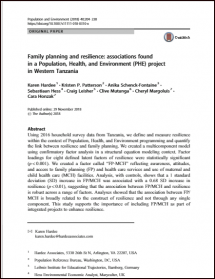Family Planning and Resilience: Associations found in a Population, Health, and Environment (PHE) Project in Western Tanzania
This study supports the importance of including Family Planning /Maternal and Child Health as part of integrated projects to enhance resilience. The paper identifies components of resilience that could be measured in Population Health and the Environment (PHE) and other integrated development projects, and uses data from a PHE project in western Tanzania to measure resilience and better understand the links between resilience and family planning.
The research aims to establish which factors contribute to resilience in the project area, with the ultimate goal of understanding how to build potential resilience among people in ecologically rich regions who rely on natural resources for their livelihoods.
Date of Publication: November 24, 2019
SIMILIAR RESOURCES
Tools
Examples
- MULTI-SBC: The Programmatic Aid for Multi-Sectoral Integration of SBC for FP Practitioners
- Healthy People, Healthy Ecosystems: A Manual on Integrating Health and Family Planning into Conservation Projects
- Integrating Family Planning into Other Development Sectors
- Designing and Implementing Integrated Approaches to Population, Health and Environment (PHE): Training Materials
- Biodiversity Results and Integrated Development Gains Enhanced Project (BRIDGE)
- PHE Field Implementation: A Simple PHE Resource Guide/Compendium for Practitioners
- Integrating Population, Health, and Environment Projects: A Programming Manual
- BALANCED Project Mid-Term Evaluation
- A Guide for Training Youth Peer Educators Working on Integrated PHE Activities
- Population, Health, and Environment Basics
- Landscape Conservation in Western Tanzania
- Health of People and the Environment in the Lake Victoria Basin (HoPE-LVB)
- Population, Health, and Environment Integration Programming Manual
- Wadata Project, Niger
- Integrating Family Planning into Development Food Security Activities: Formative Research with the Njira Project in Malawi

